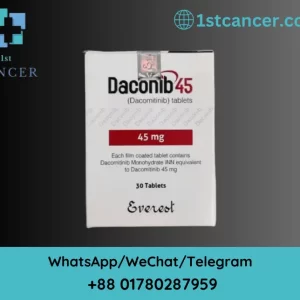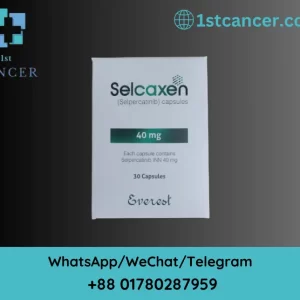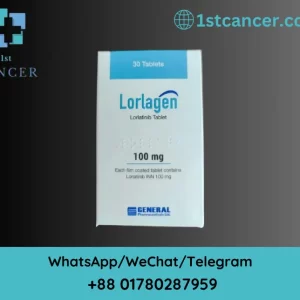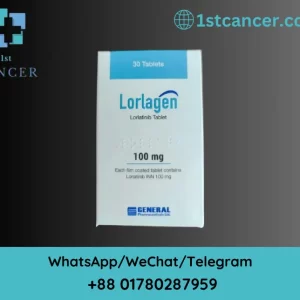Healthcare professionals use crizotinib, marketed as Alkixen, to treat certain types of cancer, especially NSCLC and other cancers with a specific genetic alteration called ALK or ROS1 gene rearrangements. Crizotinib (Alkixen) is available as 250 mg capsules or tablets and is taken orally.
Crizotinib (Alkixen) is a tyrosine kinase inhibitor, working by targeting specific proteins in cancer cells that carry the genetic alteration mentioned above. By inhibiting these proteins, Crizotinib (Alkixen) aims to slow down or halt the growth of cancer cells that harbor these specific genetic abnormalities.

Common side effects associated with Crizotinib (Alkixen) might include nausea, diarrhea, vomiting, visual disturbances, swelling, fatigue, and changes in liver function tests. However, the presence and severity of side effects can vary from person to person. It’s important to follow the prescribed dosage and usage guidelines provided by a healthcare professional and to report any unexpected or severe side effects to your doctor.
As medical information can change with ongoing research and clinical findings, it’s essential to consult a healthcare professional or refer to the most recent prescribing information and resources for the most up-to-date and detailed information about Crizotinib (Alkixen), including its usage, potential side effects, and any precautions associated with its use.
What is the drug crizotinib used for?
Healthcare professionals use Crizotinib (Alkixen) to treat specific types of cancer, especially NSCLC with certain genetic alterations. Crizotinib targets and inhibits the activity of proteins involved in cancer cell growth and survival, such as ALK and ROS1.
Specifically, healthcare professionals use crizotinib to treat:
ALK-positive NSCLC: Crizotinib is a first-line treatment for advanced or metastatic NSCLC with the ALK gene rearrangement.
ROS1-positive NSCLC: Crizotinib is also indicated for the treatment of advanced or metastatic NSCLC with the ROS1 gene rearrangement.
Unlike traditional cancer classification, the use of crizotinib and other targeted therapies is based on the specific molecular characteristics of the cancer. As with any medication, crizotinib may have side effects, and healthcare professionals should discuss its use thoroughly with patients based on their individual medical history and cancer characteristics.
Is crizotinib better than chemotherapy?
The comparison between Crizotinib (Alkixen) and chemotherapy in the treatment of cancer involves various factors, including efficacy, side effects, and the specific type of cancer being treated.
Crizotinib is a targeted therapy that works by inhibiting specific proteins involved in the growth and survival of cancer cells, such as ALK and ROS1. This makes it particularly effective in treating certain types of cancer, such as non-small cell lung cancer with ALK or ROS1 gene rearrangements. The targeted nature of crizotinib often results in a more focused impact on cancer cells, potentially leading to a better side effect profile compared to traditional chemotherapy.
On the other hand, chemotherapy is a more generalized treatment that targets rapidly dividing cells, including both cancerous and healthy cells. While chemotherapy can be effective in killing cancer cells, it may also affect normal, healthy cells, leading to a range of side effects such as nausea, hair loss, and immune system suppression.
Whether crizotinib is “better” than chemotherapy depends on the specific characteristics of the cancer and the individual patient. In cases where the cancer has specific genetic alterations that make it susceptible to crizotinib, targeted therapy may offer a more tailored and potentially less toxic approach. However, for cancers without these specific genetic markers, chemotherapy may still be a viable and effective treatment option.
Healthcare professionals make the complex decision of whether to choose Crizotinib (Alkixen) or chemotherapy for each patient, considering the type and genetic characteristics of the cancer, the patient’s overall health, and potential side effects. Personalized treatment plans, often involving a combination of therapies, are increasingly common to optimize outcomes for individuals with cancer.
What generation is crizotinib?
Crizotinib belongs to the first generation of tyrosine kinase inhibitors (TKIs) and represents a significant advancement in the targeted therapy landscape for certain types of cancer.
Approved by the U.S. Food and Drug Administration (FDA) in 2011, crizotinib was a pioneering drug in the treatment of non-small cell lung cancer (NSCLC) with specific genetic alterations. It selectively inhibits the activity of anaplastic lymphoma kinase (ALK) and c-ros oncogene 1 (ROS1), proteins that play a crucial role in the growth and survival of cancer cells.
As a first-generation TKI, crizotinib marked a departure from traditional chemotherapy by specifically targeting the molecular abnormalities driving cancer growth. The approval of crizotinib marked a landmark moment in the era of precision medicine, where healthcare professionals tailor treatments to the genetic characteristics of individual tumors. While crizotinib has shown notable efficacy, especially in ALK-positive NSCLC and ROS1-positive NSCLC, researchers have developed subsequent generations of TKIs to address limitations such as acquired resistance and off-target effects. Nonetheless, crizotinib remains a valuable option, particularly in cases where its targeted mechanism aligns with the specific genetic profile of the cancer.
The introduction of crizotinib and subsequent generations of TKIs represents a paradigm shift in cancer treatment, emphasizing the importance of understanding the molecular drivers of cancer for more effective and less toxic therapeutic interventions. The ongoing research and development in this field continue to shape the landscape of targeted therapies, offering new hope for patients with genetically defined cancers.
What does crizotinib target?
Crizotinib, a groundbreaking tyrosine kinase inhibitor (TKI), takes aim at specific proteins within cancer cells, representing a pivotal development in precision medicine for the treatment of certain cancers.
The primary targets of crizotinib are anaplastic lymphoma kinase (ALK) and c-ros oncogene 1 (ROS1), both of which are integral to the growth and survival of cancer cells. By inhibiting the activity of these proteins, crizotinib disrupts the signaling pathways that drive the uncontrolled proliferation of cancer cells, ultimately impeding the progression of the disease.
Crizotinib’s efficacy is particularly evident in the treatment of non-small cell lung cancer (NSCLC) with ALK or ROS1 gene rearrangements. In these cases, the drug’s targeted approach offers a more selective and tailored treatment option compared to traditional chemotherapy.
Researchers developed and approved crizotinib, marking a significant milestone in oncology and ushering in an era where molecular tumor characteristics increasingly guide therapeutic interventions. The drug’s success has spurred further research and the development of subsequent generations of TKIs, aiming to address challenges such as acquired resistance and expand the repertoire of targeted therapies available to patients.
In summary, crizotinib’s precise targeting of ALK and ROS1 proteins underscores its role as a key player in the landscape of targeted therapies, offering new avenues for treating specific genetic subtypes of cancer and contributing to the ongoing evolution of personalized cancer care.
How long is the treatment for crizotinib?
The duration of crizotinib treatment varies based on individual patient responses, the specific type and stage of cancer, and ongoing assessments by healthcare professionals.
Healthcare professionals typically prescribe crizotinib orally in the form of capsules for several months or even years to treat patients with NSCLC harboring ALK or ROS1 gene rearrangements. Patients take crizotinib regularly without extended breaks, as long as it effectively controls the progression of the cancer. In some cases, patients may experience a sustained response to the medication, leading to prolonged periods of disease control.
However, the decision to continue or discontinue crizotinib is influenced by factors such as treatment response, side effects, and the emergence of resistance. If a patient’s cancer shows signs of progression or if intolerable side effects occur, healthcare professionals may reassess the treatment plan.
When resistance develops, healthcare professionals may consider alternative treatment options, such as second-generation ALK inhibitors or other targeted therapies, to address the changing nature of the cancer.
Regular follow-up appointments and imaging studies are crucial components of monitoring the effectiveness of crizotinib treatment. Healthcare professionals may adjust the treatment plan based on their ongoing evaluation of the patient’s condition. In summary, healthcare professionals continuously assess and adapt the therapeutic approach to optimize outcomes for patients with ALK or ROS1-positive cancers, resulting in a highly individualized duration of crizotinib treatment. The goal is to strike a balance between controlling the disease and managing any potential side effects, tailoring the treatment plan to the specific needs of each patient.
How effective is crizotinib?
Crizotinib has demonstrated notable effectiveness as a targeted therapy for specific types of cancer, particularly non-small cell lung cancer (NSCLC) with ALK or ROS1 gene rearrangements. Its impact on patient outcomes and tumor control has marked a significant advancement in the realm of precision medicine.
In clinical trials and real-world studies, crizotinib has shown impressive response rates in patients with ALK-positive NSCLC. It works by inhibiting the activity of anaplastic lymphoma kinase (ALK), a protein that, when abnormally activated, promotes cancer cell growth. The targeted approach of crizotinib disrupts this signaling pathway, leading to a marked reduction in tumor size and, in some cases, prolonged periods of disease control.
Similarly, crizotinib has demonstrated efficacy in treating NSCLC with ROS1 gene rearrangements. By targeting the c-ros oncogene 1 (ROS1), crizotinib interferes with the aberrant signaling that fuels cancer progression.
The effectiveness of crizotinib, however, is not universal, and individual responses can vary. Some patients experience a substantial and sustained response to the medication, leading to extended periods of disease stability. However, not all patients respond equally, and some may eventually develop resistance to crizotinib.
Despite its success, ongoing research aims to address challenges such as acquired resistance, with the development of next-generation ALK inhibitors and combination therapies. These efforts seek to further optimize treatment outcomes and provide additional options for patients who may experience resistance to crizotinib.
In conclusion, crizotinib has proven to be a valuable and effective therapeutic option, particularly for those with ALK or ROS1-positive NSCLC. Its targeted mechanism of action has reshaped the treatment landscape, showcasing the potential of precision medicine in tailoring therapies to the specific genetic characteristics of individual tumors and improving outcomes for patients with certain types of cancer.
What class of drug is crizotinib?
Crizotinib belongs to the class of drugs known as tyrosine kinase inhibitors (TKIs), representing a significant advancement in the treatment of certain types of cancer. This class of medications specifically targets and interferes with the activity of tyrosine kinases, enzymes that play a crucial role in the growth and division of cells, including cancer cells.
As a tyrosine kinase inhibitor, crizotinib disrupts the signaling pathways that drive cancer cell proliferation by selectively inhibiting the activity of proteins such as anaplastic lymphoma kinase (ALK) and c-ros oncogene 1 (ROS1). These proteins, when aberrantly activated due to genetic alterations, contribute to the uncontrolled growth and survival of cancer cells, particularly in non-small cell lung cancer (NSCLC) with ALK or ROS1 gene rearrangements.
The introduction of crizotinib marked a paradigm shift in cancer treatment, moving away from conventional chemotherapy towards targeted therapies that address the specific molecular characteristics of individual tumors. This targeted approach not only enhances the efficacy of treatment but also often results in a more favorable side effect profile compared to traditional, more indiscriminate treatments.
While crizotinib has demonstrated effectiveness, ongoing research continues to explore and develop additional TKIs to overcome challenges such as acquired resistance and to expand the repertoire of targeted therapies available for patients with various types of cancer. In summary, as a member of the tyrosine kinase inhibitor class, crizotinib exemplifies the evolution of cancer therapeutics toward more precise and personalized treatment strategies.





